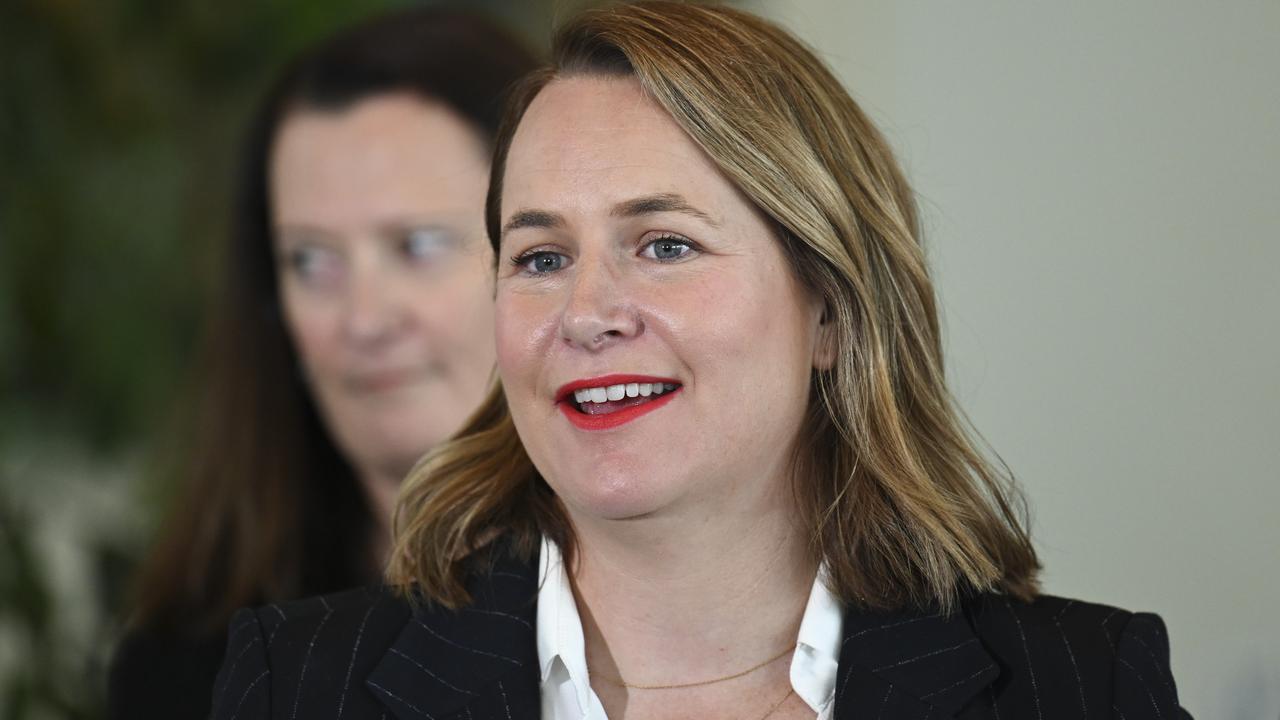Voluntary assisted dying is now legal in Queensland
These are some of the more than 1000 Queenslanders expected to apply for Voluntary Assisted Dying in 2023 after it became legal on January 1. VAD LAWS EXPLAINED

News
Don't miss out on the headlines from News. Followed categories will be added to My News.
More than 1000 Queenslanders are expected to apply for Voluntary Assisted Dying this year as the state becomes the third jurisdiction in Australia to offer an end of life choice to the terminally ill.
Passed by state parliament in 2021, the VAD Bill officially became accessible in Queensland on January 1, allowing eligible residents to apply to receive a dose of a lethal substance which they can then choose to take.
These are just some of the Queenslanders who want the choice to die with dignity.
Townsville mum ‘can’t wait’ to apply for VAD
Irene Bizon’s dying wish is to be able to “go peacefully,” while laying in bed, holding her two son’s hands.
The Townsville mother has less than six months to live and told the Courier-Mail she “can’t wait” to apply for VAD.
Ms Bizon, 78, was diagnosed with lung and bowel cancer last year and was recently told she has about six months to live.
“I want to start the paperwork as soon as possible, I can’t wait,” Ms Bizon said.
“The doctors told me it’s highly unusual to have both cancers, I’ve been very unlucky. I’ve got a bad heart and diabetes too.
“I was told I have about six months, but I think it will be sooner, I can feel everything going wrong inside myself.
“My stomachs not digesting properly, I’ve got a huge lump growing and my stomach lining is torn, there’s so many health reasons why I want to go gently and in peace before my bowels burst or I’m in hospital in a vegetative state, just a shell.”
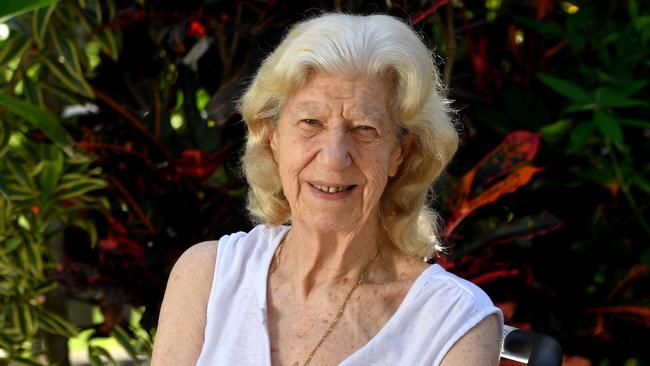
Even as she knocks on death’s door, Ms Bizon is grateful that Queensland’s VAD Bill had come into effect before her expected rapid deterioration.
“That’s what’s making me feel good about my diagnosis now,” she said.
“I’m dying but I’ve accepted the fact because it’s optional for me to pick a date and time and I can say I’m ready, I’m going now.
“The indignities for my family to watch me go awfully like that, I don’t want anyone to go through that. I want my boys smiling at me, holding my hand and to say goodbye.
“Live with dignity and die with dignity, we all want that. Freedom of choice.”
Ms Bizon began preparing for VAD at the beginning of December, but has struggled to gain information on exactly when and how forms would become available to her.
She said her General Practitioner is also confused and has been getting minimal updates about the VAD rollout.
“I’ve been talking to him about it for four weeks and he only got an email from Queensland Health last week and it tells him nothing, he showed it to me and there’s nothing about the forms, nothing,” she said.
“He has no idea what’s happening with it, or how much of his time it’s going to take up.
“The government is behind the block and all I’d like to know is who in Townsville is going to do it.”
Mum’s choice … dignified and peaceful
Her ill mother pass via voluntary assisted dying has given nurse and Griffith University research professor Ann Bonner a unique perspective on the new law.
Vera Hun suffered from leukaemia, lymphoma and two types of bowel cancer, and received active treatment including chemotherapy, radiation and amino therapy for about 10 years prior to applying for VAD.
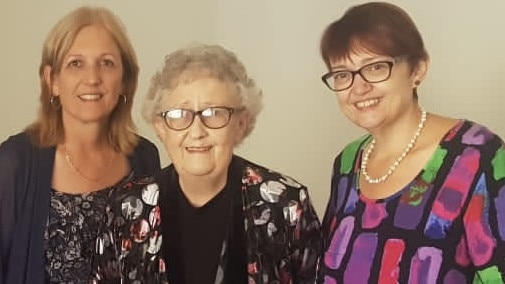
Ms Hunt lived in Victoria and by early November 2020 had met all the VAD requirements and was trained around the substance.
“Mum said at the time she just wanted to have the choice available, having that peace of mind,” Ms Bonner said.
“She didn’t have a definite date in mind.
“Her granddaughter was allowed into hospital and my sister and I were trained over the phone. It’s a simple training with a step-by-step instruction and there’s a lockbox with all the (VAD) substances in it.”
In 2021 Ms Hunt’s life began deteriorating rapidly, and she decided to take the VAD substance on the evening of March 29.
“I was there, my sister Cathy was there, our husbands … we arranged for two of her three grandchildren to be there, she was able to speak to her other sister and granddaughter in London over FaceTime.”
Ms Bonner said within a few minutes of taking the substance, her mother closed her eyes and passed away looking calm, dignified and peaceful. “VAD is a choice and Mum wanted her own choice at her own time. She didn’t suffer.”
Couple helping others while fighting cancer
After watching her brother die an agonising death in 2018, Moya Jackson and her partner Mark Heron decided to join Dying With Dignity Queensland and help promote the state's new Voluntary Assisted Dying laws.
But the organisation would soon take on an entirely new meaning for the pair who have now each received their own cancer diagnosis.
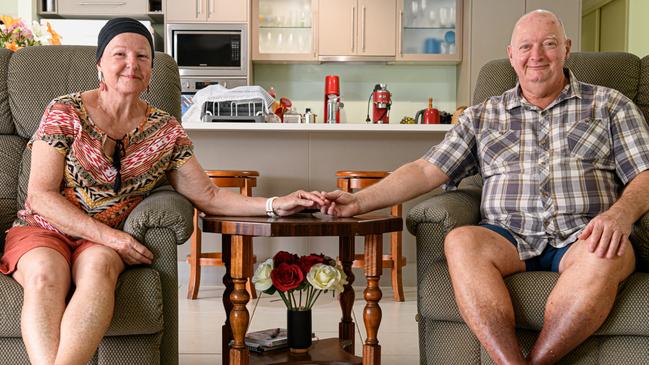
Ms Jackson’s brother passed away within four months of learning of his pancreatic cancer.
His family were able to make it to Lismore in New South Wales, but Ms Jackson said it was tough to watch her brother die “a grisly death” while he begged doctors to end his suffering.
“He had absolutely no chance,” she said.
“You shouldn’t have to go through that pain because every time he was conscious, he was in agony and abusing the doctor because the doctor wouldn’t give him anything to finish it, and the doctor couldn’t.
“What really got to us (family members) was while he was in pain, he was quite conscious and fully capable of making up his own mind and saying what he wanted and that was not available to him.
“A lot of people say it’s just like euthanasia, well, it’s not because the difference is if I’m using it (VAD), or if my brother was able to have used it, it was a choice he made about his body.”
In May 2020, Ms Jackson began her own pancreatic cancer journey, and after undergoing seven rounds of chemotherapy and an intense Whipple procedure to remove part of her pancreases, her cancer returned.
But with VAD now accessible to Queenslanders, she was able to feel a sense of relief and control over her future.
“I think from the day that you’re diagnosed, you don’t have control, but knowing now that this is available, it’s actually making me feel better in any case,” Ms Jackson said.
“At some stage, I may choose to go with a VAD choice, I may not. I may choose to but not need end up needing it.
“It's just as they say, it’s the option, I’ve got the option of a choice as to how I’m going to live out my days.”
While Ms Jackson came to terms with her renewed diagnosis, her partner Mark received similar devastating news. He too had cancer.
“2022 has been a bit of a dicey year for us because I was diagnosed with potentially fatal cancer in January,” Mr Heron said.
“Just in the last couple of weeks I've been given the all clear but I had a very threatening case.”
If Mr Heron’s cancer returns he may also consider VAD as an option.
“Just because someone has a religion that says there‘s nobility in suffering doesn’t mean that we’ve got to,” he said.
The couple continue to monitor community social media pages dedicated to answering questions about Queensland’s VAD process, with the new service available from January 1.
Queensland’s journey to VAD laws
Of Queensland’s 93 MP’s, 61 voted to pass the VAD Bill on September 16, 2021, including ten LNP members, two Greens and independent Sandy Bolton.
North Queensland MP Aaron Harper was chosen to lead a VAD inquiry in 2018 which received over 10,000 submissions that helped shape the Bill.
“After 30 years caring for people in the back of an ambulance, I was really glad they chose me to do this job,” Mr Harper said.
“We held 45 public hearings across the state, from rural and Indigenous communities right through.
“It highlighted so many issues of people suffering at end of life, their families were shaken, stories of people watching their loved ones suffer and wanting to help.
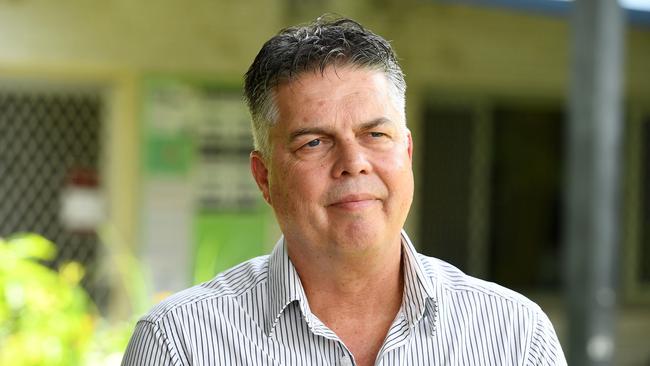
“I remember a woman in Bundaberg held up an A4 envelop saying this was her husbands stage 4 care package that had arrived two weeks ago. He had died two and a half years ago.
“I was deeply moved by the stories and submissions, they drove me to make Queensland do better and build on all VAD aspects that other states hadn’t quite gotten to.”
Queenslanders aged 18 or over must be diagnosed with a painful terminal illness with a life expectancy of 12 months or less, to be able to apply for VAD.
People wanting to apply have to take part in a multi-step process involving requests, referrals and consultations with general practitioners that ensures they are capable of making their own voluntary decisions.
Unlike its predecessors, Queensland’s legislation allows nonparticipating GPs to refer their patients to someone who can take them through VAD options and hospitals are not allowed to turn away a VAD patient regardless of religious association.
According to Dying with Dignity Queensland, more than 1000 people are expected to apply to receive VAD in 2023, resulting in up to 430 deaths.
“The largest thing in our Bill, is the is the fact that every facility, every hospital, has to let somebody in,” Dying with Dignity Queensland vice president Jeanette Wiley said.
“The saddest thing is that, at this stage, dementia and mental health are not included and all we can say to our members is to be patient.”
A central pharmacy has been established to hold VAD substances, with doctors and nurses invited to register their interest to receive training in becoming an authorised VAD administrator.
Australian Medical Association Queensland president Dr Nick Yim said overall, doctors had been happy with the VAD consultation process.
“The main feedback provided over many months by not just hospital doctors but also general practice doctors, those in palliative care, and specialists in areas like oncology and cancer care, was making sure they had enough resources for the patients and their families and for physicians who weren’t participating,” Dr Yim said.
“Not all doctors can agree with legislation, there will be conscientious objections, just like the general public and we have provided them the resources so they can refer patients to the right doctor.”
Townsville based doctor Michael Clements said he would not be participating in VAD but was pleased that the VAD process sat directly with GPs.
“We are the ones that know our patients through that journey and how it changes over time,” Dr Clements said.
“People have to be careful about having a black and white view with VAD because perspective changes as disease progresses.
“It’s all about patient autonomy.”
With VAD now accessible to Queenslanders, Dr Yim said it was important that the state continue to focus on providing proper palliative care.
“We can’t take focus away from palliative care and its funding … and with that comes adequate staffing, including support workers,” he said.
“We need to make sure Queensland is adequately resourced in palliative care, some regional and remote areas don’t currently have enough access.
“I think you can look at Scandinavian countries where there has been a slight increase but its not as high as what people predict because they have a good palliative care service and we know when there’s good palliative care services, patients are less likely to think that VAD is at the only or best way forward.”
Further information about VAD can be found via the Queensland Health website, here.
More Coverage
Originally published as Voluntary assisted dying is now legal in Queensland




